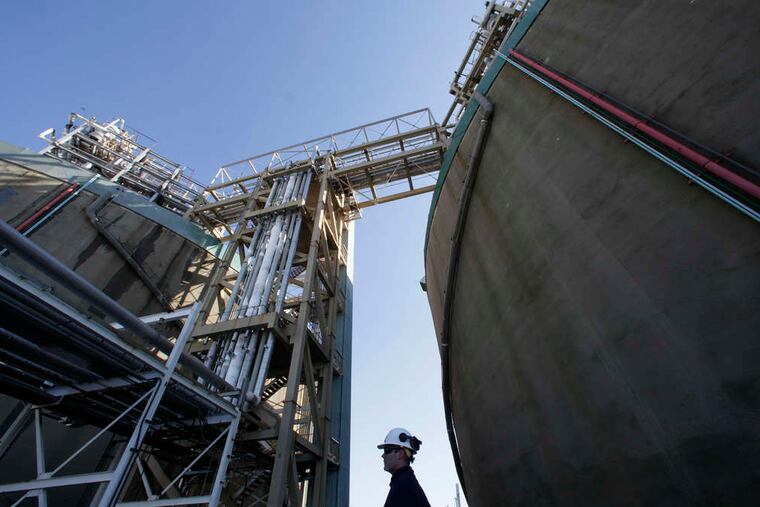Sale of PGW a complicated matter
Mayor Nutter last week launched a process to explore the sale of city-owned Philadelphia Gas Works. Already some commentators are beginning to count up the millions the city will earn.

Mayor Nutter last week launched a process to explore the sale of city-owned Philadelphia Gas Works. Already some commentators are beginning to count up the millions the city will earn.
Not so fast.
Though a feasibility study by Lazard Freres & Co. L.L.C. said the city could net up to $496 million by selling PGW, buyers are likely to offer a price that would yield a smaller payday, analysts say.
The Lazard study assumes that in the best case a strategic buyer - probably another natural gas utility - would be able to reduce nonfuel operating costs 28 percent through synergies, such as combining administrative functions like customer service and gas procurement, and improving collections.
But achieving such savings is not assured. A 2007 study of utility mergers and acquisitions by the Boston Consulting Group found that fewer than half of the mergers failed to achieve projected cost savings. Some ended up even adding costs.
And a private owner would have to overcome some inherent advantages enjoyed by the nonprofit municipal utility, which pays no income taxes on earnings and does not have to produce a return on equity, other than an $18 million annual franchise fee it pays the city.
"All things being equal, a municipal utility has certain cost advantages," said Irwin A. "Sonny" Popowsky, Pennsylvania's consumer advocate, whose office would analyze any proposed sale or merger for its effect on consumers.
A sale would also have to overcome likely political inertia from officials reluctant to part with a business the city has owned for 176 years and that serves 500,000 customers, including 150,000 low-income residents.
A 2008 study by the Economy League of Greater Philadelphia valued PGW at $1.3 billion to $1.5 billion, less than its long-term debt and employee retirement obligations. That study said the city would "likely have to pay another entity to take PGW off its hands."
George W. Bilicic, Lazard's vice chairman of investment banking, said PGW's value had increased in the last five years because the managers had improved collections, operations, and financial stability.
"It's clear that the management team has really fixed this company," he said, referring to former chief executive officer Thomas Knudsen and current CEO Craig White.
In an interview Friday, Bilicic said he was "very confident" the city could make money selling the utility. His firm's study pegs liabilities and long-term debt at about $1.5 billion, and the value of the enterprise at between $1.5 billion and $1.85 billion.
The city's next step is to retain advisers to market the utility through multiple rounds of bidding and negotiations, a process that could take up to 12 months. Approvals of the Pennsylvania Public Utility Commission and the City Council could take another year.
Nutter's spokesman, Mark McDonald, said the mayor only wants to sell if the city fetches a "substantial" profit.
James H. Cawley, one of five members of the Public Utility Commission, has called for the city to privatize the utility at any cost. He says that now is the time, while the price for natural gas is low and the next mayoral race is three years away.
"It's my view that the sale would be beneficial even if the city does not profit," he said in an interview Friday.
Cawley has argued that the city utility, with its substantial low-income population, does not have the financial resources to replace its aging infrastructure. He also says that the PUC has more leverage over investor-owned utilities because it can impose penalties that hurt stockholders, forcing managers to change.
"What I would say to the mayor going into negotiations is this is an opportunity to remove risk and free resources," Cawley said. "This is a real opportunity to avoid huge future cash outflow and present liability, and potentially a much greater future liability."
Who might be interested in buying PGW is another question.
A natural choice would be Peco Energy Co., the Philadelphia utility that provides gas service to 490,000 customers in the counties surrounding Philadelphia. Peco provides electric service in Philadelphia, so it already has relationships with PGW's customers.
Cawley said the PUC considered forcing Peco to absorb PGW in 2006 as a condition of accepting a proposed merger between Peco's parent company, Exelon Corp., with New Jersey's Public Service Enterprise Group Inc. But the merger failed. Peco was not eager to take in PGW, Cawley said.
"Peco was not interested," he said. "I won't put a finer point on it than that, but maybe times have changed."
Exelon spokesman Paul Elsberg said the company was always evaluating opportunities to add value for shareholders, but he could not comment on specific deals.
A potential buyer might not own a contiguous utility or even one in Pennsylvania.
Lazard, in its feasibility study, spoke with six potential buyers that were not named, including two that are "financial" buyers, such as private-equity funds.
One concern that arose among companies with other utilities in Pennsylvania was the "cross-subsidization" of their existing customers with PGW's base. PGW's rates are the highest in the state, largely because more than 80,000 of its low-income customers are enrolled in programs in which their bills are subsidized by other customers.
Cawley said he believed that PGW's rate base must be absorbed into another utility's in order to spread out its costs.
"You couldn't just leave PGW as a stand-alone," he said. "I would prefer the assimilation of the current customer base into a contiguous utility over a period of time. It wouldn't have to happen immediately."
But such a move, even if it had only a slight increase in rates for the acquiring company's customers, would be likely to prompt resistance.